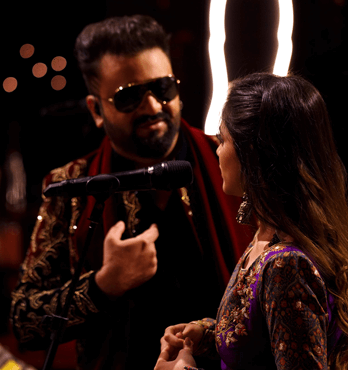Dhola

by Ayesha binte Rashid
One of the facets of music is the performance of it — the finishing touch of a song is in its delivery, how the lyrics come to life in the musician’s expression of it. In a performance done well, one can find the singer embodying the character and persona the song requires of them. This is Sahir Ali Bagga’s effort for Dhola, as he steps into the world of the song, taking on the character of the piece.
“The voice is the character of the song. If the song doesn’t get its character, its incomplete,” says Sahir, who is popularly known in the industry as Bagga, “the song, as I’m imagining it to be, it requires that character.” For upbeat, happy beats like Dhola, Bagga personifies a carefree character who matches the jubilation expressed in the song’s lyrics and musical arrangement. In his previous performances on Coke Studio – in Baazi, Malang, and Roye Roye – his vocal character is as distinct in all three songs as the character for Dhola is from theirs. This is Bagga’s performance, his character becoming the manifested expression of the song.
The process of creation takes preparation and practice, and requires technical awareness of one’s voice. For this particular piece, Bagga had to adjust his regular vocal range and sing in a higher octave than what he’s accustomed to. “When you’re singing in a high scale, all your effort is focused on it. I’m using a lot of energy, with a lot of power. But it should sound soft. That’s why I have to put some effort into this character,” he explains. Laughing, he adds that he will have to abstain from certain foods leading up to the performance to ensure that his vocal cords are in peak condition.
Dhola is a conversation between two characters and joining Bagga in this conversation is Aima Baig. Even at this young age, Aima’s vocal prowess allows her to adapt her vocal quality to embody the mood of a song. While her character in Dhola demands particularly difficult needs of Aima, the artist acknowledges these challenges and meets them head on. Like Bagga, the song requires her to showcase the versatility of her vocal range. Even when Bagga is singing in a higher octave, it is lower than Aima’s vocal range and, in other parts, she must sing higher than she is used to. This becomes a fascinating challenge in vocal experimentation for the artist as she commits to her character.
The next challenge for Aima is that the song is in Seraiki, a language that she is not well-versed in. “I would not like it if someone is not talking properly in my language,” she says. For the Seraiki-speaking population of Pakistan, she is determined to do justice to the lyrics, especially since this includes her own father. “That was another thing on my mind, that Abba Ji would get upset, he’ll say ‘What have you sung?’,” she laughs. This is not the first time that Aima has sung in Seraiki but hearing the demo for Dhola confirms the challenge – this is a particularly difficult song in the language. For Aima, this is a matter of doing justice to the composition regardless of how daunting a task it is. Within the challenge lies the beauty of evolution and growth and this is something Aima is determined to master. She soldiers on and steps into her character.
The characters meet. The conversation begins. Bagga and Aima’s voices call out to each other over the sound of percussions, string instruments, and keyboards. “Keeta main tainoon bonh pyaar e,” says Bagga, “I have loved you with all my heart,” a line that plays on declarations of love found in folk songs. In this way the conversation continues, with the two characters professing their love for each other. One declares that she has loved him since her childhood, the other replies saying that her beautiful eyes have pierced his eyes. It is a happy, playful conversation between two characters who are enjoying a romance that is mutual and blissful. But there is also a sense of vulnerability, hinting at the bittersweet taste of love. The song rises and falls, weaving between festive and soulful, as our characters switch between playful and vulnerable.
Dhola is an illustration of happiness in love, a song that calls to the exhilaration of true romance. As the two characters converse, one is reminded that love is about vulnerability, without which one could not experience the delight that comes with being truly open with someone else. Dhola is ultimately a celebration of love. As Bagga and Aima open up their vocals to new heights, the song can be seen as an expression of what happens when one allows for some vulnerability and just takes a leap of faith.
